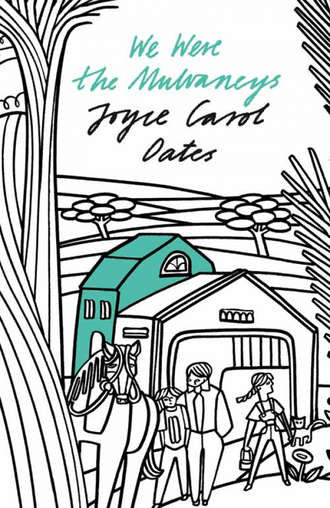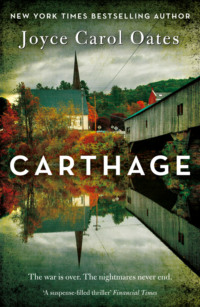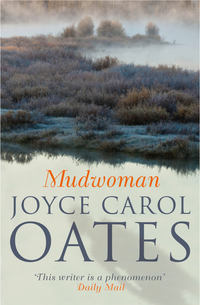
Полная версия
We Were the Mulvaneys
It’s fine, I have it. It’s fine.
FAMILY CODE
Many things were coded at High Point Farm. Like our names which could be confusing for they depended upon mood, circumstance, subtext.
For instance, Michael Sr. was usually Dad but sometimes Curly and sometimes Captain. He could be Grouchy (of the Seven Dwarves), or Groucho (of Groucho Marx fame), he could be Big Bear, Chickie, Sugarcake—these names used exclusively by Mom. My oldest brother was usually just Mike but sometimes Mike Jr. or Mikey-Junior; sometimes Big Guy, Mule, Number Four (his football jersey number for the three years he excelled as a fullback at Mt. Ephraim High). Patrick was frequently P.J. (for Patrick Joseph) or Pinch. Marianne was frequently Button or Chickadee. My names, as I’ve said, were many, though predominantly Baby, Dimple, Ranger.
Mom was Mom except for special names which only Dad could call her (Darling, Honeylove, Sweetheart, Sugarcake). Occasionally Mom could be called Whistle—but only within the family, never in the presence of outsiders.
It was a matter of exquisite calibration, tact. Which code name at which time. Especially in Mom’s case, for there were times when being called Whistle seemed to vex her and other times when it was exactly what she wanted to hear—she would laugh, and blush, and roll her eyes as if her innermost soul had been exposed.
Why Whistle? Because Mom had a habit of whistling when she believed herself alone, and to those of us who overheard, her whistling was a happy contagious sound. In the kitchen, in the antique barn; tending the animals; in her garden through the long summer and into the fall. Mom’s whistling was loud and assured as any man’s but with a shift of mood it could turn liquid and lovely as a flute. You’d listen, fascinated. You’d think Mom was speaking to you, without exactly knowing it, herself. Locking stanchions around the thick neck of a cow, scrubbing a horse’s mud- and manure-splattered coat, fending off enraged fowl who’d hoped to hide their eggs in the hay barn, especially in the early morning when she and our canary Feathers were the only ones up—there was Mom, whistling. “Faith of Our Fathers”—“The Battle Hymn of the Republic”—“Tell Me Why the Stars Do Shine”—but also “I’m Dreaming of a White Christmas” (a year-round favorite, to Dad’s exasperation)—“I’m Forever Blowing Bubbles”—“I’ll Be Seeing You”—“Heartbreak Hotel”—“Hound Dog”—“Blue Suede Shoes” (though Mom claimed to disapprove of Elvis as a poor moral example for the young). When she was in the house, Mom was likely to be whistling with Feathers, who, like most male canaries, responded excitedly when he heard whistling in or near his territory. Whistling was a quick expedient way of communicating with the livestock, of course: the horses whinnied alertly in reply, pricking their ears and flicking their tails as if to say Yes? Time to eat? Cows, goats, even sheep blinked to attention. Two deft fingers to her mouth, a shrill penetrating whistle, and Mom could bring dogs, cats, barnyard fowl and whatever else was in the vicinity to converge upon her where she stood, usually beneath one of the carports in an area designated for outdoor feeding, laughing and bountiful as the Goose Lady in our well-worn old copy of Grimm’s Fairy Tales.
Dad whistled, too. Hummed happily under his breath. But none of his names alluded to his musical ability or lack of ability.
Coded too were the ways in which we sometimes spoke to each other through animals. This was a means of communication that predated my birth, of course. I remember as a very young child crawling energetically on a carpet, and Dad and Mom praising me to one of the dogs—“Foxy, look! Baby is as fast as you.”
Such a way of addressing one another was a witty, playful means of making simple requests: “Silky, will you trot over and ask Curly when he wants supper, early or late; and when he plans on husking the sweet corn, in any case.” Or, in a raised voice, “Snowball, will you please ask Judd to come out here and give me a hand?” It was a favored means for mild scolding: “Muffin, please ask a certain somebody”—this might be Mike, Patrick, Judd, or even Dad—“how long he plans on lounging there with the refrigerator door wide open?” Mostly such remarks were from Mom or Dad. When we kids imitated them, the code seemed somehow not to work, quite. I remember Mike furious at Patrick for some reason, the two of them riding their horses in the front drive, Patrick stiff and upright in the lead, his horse’s tail flicking, and Mike calling after, “Hey, Prince: tell your rider he’s a horse’s ass, thanks!” But both Prince and his rider ignored the taunt, breaking into a canter to escape.
Most of these exchanges, in fact, were inside our house. Now that I think of it, most were in the kitchen. For the kitchen was the heart of our household; where we naturally gravitated to seek one another out. The radio was always on, turned to Mom’s favorite Yewville station; there were always dogs and cats underfoot, looking to be petted or fed; of course, Feathers was a permanent resident in his handsome brass cage near the window. Of all the Mulvaney pets, it was Muffin the cat who was the favored medium for such exchanges; Muffin who was sweetly docile and patient and so unfailingly attentive when we human beings spoke, you’d swear he understood our words. With comical intensity Muffin would look from one speaker to the other, and back, and again, like a spectator at a tennis match. His tawny cat-eyes flashed sympathy, concern. It was almost possible to think, as Dad insisted, that Muffin wasn’t a cat but a human being in disguise; yet, being an animal, he was ever so much nicer than any human being. “Muffin, you and I understand each other, don’t we?” Dad would say, stooping to pet the cat, shaking dry food out of a box into a dish for a between-meals snack that was in fact against Mom’s household diet rules just as Dad’s own forays into the refrigerator between meals were against the rules, “—both of us endomorphs, eh?” Dad was growing ever more husky with the years, his muscular torso thickening, his belly pushing out over his belt; he would never be a fat man, nor even plump, for there was no softness to him, only a kind of defiant sinewy flesh. Muffin had begun his Mulvaney life as an abandoned kitten, rescued with his brother Big Tom from imminent death by starvation in a landfill off High Point Road, so tiny he could fit into the palm of the youngest Mulvaney’s hand; with alarming swiftness he’d grown into a soft heavy adult male, neutered, weighing somewhere beyond twenty pounds. He was by no means a beautiful animal though his coat was silky-white, always impeccably clean, with lopsided markings like a child’s drawing in orange, black, gray, brown. His head was round as a cabbage. His tail was ringed as a raccoon’s. He’d been Marianne’s kitten from the start, but we all loved him. Dad was a little rough showing his affection, hauling the big cat up onto his lap as he sat at the kitchen table sipping coffee and making telephone calls. It was Dad’s habit to speak craftily through Muffin to certain of his sons—“Muffin, one thing puzzles me and maybe you can clear it up? Why, after I made a simple request five days ago is the tire on the goddamned John Deere still flat?” The object of such remarks was usually Mike, who tended to slight his farm chores. So Mike would say to Muffin, with a smile, “Muffin, explain to Dad I’m just a little behind, I’m still mucking out those goddamned stalls. Tell him I’m sorry, sir!”
There was a protocol to such exchanges, a logic to the most circumlocutory of maneuvers. When the code was broken the effect was like a slap in the face. That time Marianne entered the kitchen so quietly I didn’t know she was there at first, this would have been early evening of the day following Valentine’s Day, early evening of the Sunday she’d been at the LaPortes’. Less than twenty-four hours after it had happened to her and in that limbo of time when none of us had any idea, any suspicion. I was hurriedly finishing one of my household chores, cleaning out some of the accumulated magazines, newspapers, mail-order catalogues from the kitchen alcove, and Mom was trimming a half dozen plants she’d brought to set on the table, whistling under her breath, and I heard her say in her bright-flirty voice, “Feathers!—what’s this I’ve heard about a certain someone not getting to church this morning?” There was a moment’s startled silence, I turned to see that Marianne had come in. Her back was to me. She wore jeans, a sweatshirt. Her hair was pulled roughly back in a ponytail. She said, so softly I almost couldn’t hear, “I—I think it’s cruel for that poor bird to be caged his entire life so that selfish human beings like us can be entertained by him. I think it’s a sin.”
Mom was so surprised, the shears slipped from her fingers and clattered to the floor.
Not just that Marianne of all her children had spoken these harsh words but that Marianne had broken the code. When Mom or Dad addressed you by way of an animal, you always replied the same way. Yet, suddenly, Marianne had not.
Mom said, defensively, drawing herself up to her full height as if her very integrity had been challenged, “Why, Button! What do you mean? Feathers is a canary bred for the cage, and so were his parents and their parents going back for generations! Feathers wouldn’t have any life if he hadn’t been bred for the cage. He was born in that cage, in fact. You could say that the cage is Feathers’ life. And it’s a lovely nineteenth-century brass cage, an antique.” Mom’s voice was tremulous with hurt and indignation, as when she argued politics with Dad, rising on the reverential word antique.
Marianne said, almost inaudibly, “Mom. It’s still a cage.”
Turning then, with a sigh of exasperation, or a muffled sob, taking no heed of me but hurrying out of the kitchen before Mom could protest any further. Mom and I stared after my sister in mutual astonishment as she pushed blindly through the swinging door into the dining room, and was gone.
Did you know, Marianne: how by breaking the code that day, you broke it forever? For us all?
DIRTY GIRL
Mike Mulvaney Jr. was a senior at Mt. Ephraim and he was on the football team and some of his buddies were involved with the girl but he had not been involved. “Mule” heard all about it, for sure. But he had not been involved.
What can you expect of a girl like that. That kind of a girl. Her mother, her sisters. County welfare. Runs in the family.
What the Mt. Ephraim guys did after the last game of the season. Three or four guys on the team and some older guys who’d graduated the year before. Sure, they were all friends of Mike Mulvaney’s but Mike Mulvaney had not been one of them, that night.
Getting a retarded girl drunk. Doing—you know, things—to her.
Hey: she isn’t retarded. Who says that?
The whole family, the Duncans—the mother’s an alcoholic, she’s got Indian blood. Comes from the Seneca reservation.
That’s not what I heard. I heard they’re—you know, Negro.
Well it’s all the same. That kind of people. At that—what d’you call it—trailer court—
Trailer village. On the Haggartsville Road.
Mule knew all about it, or maybe just a little about it. Guys exaggerate. They were all drunk. In the Mt. Ephraim Cemetery—wild! You can’t believe everything you hear. Della Rae Duncan went out with all kinds of guys including guys in their twenties, and older. Or it was her sister, or one of her sisters—the one with the baby. Baby pitch-black as tar. No, that’s the one that died. Wasn’t it a hole in the heart?
On Monday morning we began to hear of it. First on the school bus, then at school. Nobody knew exactly. None of the younger kids knew. Their older brothers wouldn’t tell and it wasn’t clear if their older sisters knew: they’d frown, look away. There was the exciting promise something had happened which was a still more exciting promise somebody’s going to get into trouble. Either Della Rae Duncan had had something happen to her or she was going to get into trouble or both.
Della Rae was one of the big girls on the bus. Fifteen years old and still in ninth grade. She wasn’t in special ed like a cousin of hers, a tall hulking boy with a harelip. Some of us believed she’d started off in special ed, in seventh grade possibly, but she was in regular ninth-grade classes now.
Della Rae was a dirty girl we’d hear. It was just something you knew. There were certain dirty girls and Della Rae Duncan was one of them. Some of us thought that Della Rae was a dirty girl because her skin was dirty, and her clothes. Her skin looked stained, like wood. She was a short heavyset girl with sizable breasts. A bulldog face. Large thick-lidded eyes and a snaky scar on her swollen upper lip. She was almost nice-looking except she was ugly. She was shy except for her quick temper. She wore boys’ jeans and a khaki jacket every day through the winter and she smelled of woodsmoke and underarms. She smelled of the inside of a trailer that doesn’t get aired. Her hair was stiff with grease and fitted like a cap over her head, not like normal hair we thought. You could see it was black hair yet it didn’t look black exactly, more like it was coated with a thin film of dust.
Della Rae wasn’t waiting for the school bus with the other kids at the trailer village, Monday morning. Nor Tuesday. Nor Wednesday. Thursday she was back again, same bulldog face. Dark-stained skin. Puffy-lidded eyes. That pea-colored jacket with a drawstring hood that looked like it’d been used to wipe hands on. Della Rae stared through us making her way to the back of the bus where she sat with another girl they said was part Indian or possibly part Negro. Or both.
At the senior high there was talk, but only in secret. Whispering, sniggering. Guys told one another in the lavatories or at their lockers, heads bent, faces creasing in amazement, lewd grins. There was much laughter. There were expressions of incredulity. How many? How long? When? The girls, of course, knew nothing about it. Especially the nice girls knew nothing about it. They did not want to know for just to know of certain things was to be sullied by the knowledge. It was possible to pray sincerely and passionately for an afflicted person (like Della Rae Duncan) to be aided by Jesus Christ without knowing exactly why.
Maybe, in fact, it was better not to know why? You could feel sorry for that person, and generous. You didn’t shrink away in disgust.
A year or so before, an older brother of Della Rae Duncan’s was reported killed in Vietnam. His name would eventually be engraved, with other “casualties” from Mt. Ephraim, on a granite marker in front of the post office.
His name was Dwight David Duncan and he was a private first class in the United States Army, twenty years old at the time of his death. Since dropping out of high school he’d worked for Mulvaney Roofing. When his picture appeared on the front page of the Mt. Ephraim Patriot-Ledger, Dad exclaimed, “Son of a bitch! Dwight Duncan! Poor kid.”
We gathered around to stare at the picture and read the columns of print. Dwight David Duncan was no one we knew, but the fact that Dad knew him, and was so upset, seemed to bring him into the house with us; into the kitchen, where even the dogs moved about uncertainly, worriedly. Private First Class Duncan was a burly, swarthy-skinned boy with heavy-lidded eyes like Della Rae’s and lank, straight, Indian-seeming hair. He’d been photographed in his dress uniform, his cap tilted back rakishly on his head; a cigarette slanted from his mouth. Dad was saying what a good, hardworking kid, very quiet, not too bright maybe but able to follow orders with no questions asked, and no complaints. “God spare us, Mikey-Junior never gets called,” Dad said, sighing. There was a pause, and he added, as always when he was on this subject, “Still, the war needs to be fought.”
This was like tossing a lighted match into a can of gasoline.
Mom said, “Why does it need to be fought?”
Dad said, “Darling, we’ve been through this already.”
Mom said, “Yes, but you never change your mind!”
Dad said, calmly, with a wink at us kids, “Well, you never change your mind.”
By this time Mom would be pacing about, arms flailing, eyes hot with anguish. If there were cats in the kitchen they’d rush out, ears laid back. If Little Boots was present, the most anxious of the dogs, he’d dance about clicking his toenails on the linoleum floor and whimpering up into his mistress’s and master’s faces, vivid to him as balloon faces. Mom who’d given impromptu, stammering speeches on the subject to relatives, at prayer meetings, at the P.T.A. and in the A & P, would choke back sobs of frustration, saying that the war in Vietnam had to stop, the killing had to stop on both sides, what a terrible thing, what a tragedy. Tearing the country apart! Turning fathers against sons! It was like the 1850s when the Fugitive Slave Act tore the country apart and led to the Civil War and almost four hundred thousand deaths, such a cruel, inhuman, ignorant piece of legislation, and now in enlightened times wouldn’t you think our leaders would have learned from the past? “First Kennedy, then Johnson, and now Nixon!” Mom cried. “What we need to save us is a true Christian leader, before it’s too late.”
“Yes,” said Dad, “—but the fact remains, the war needs to be fought.”
“No, no it doesn’t! You’re wrong!”
“Because the Communists have to be stopped, pure and simple,” Dad said. He spoke quietly, stubbornly. His broad handsome face glistened, his curly hair caught the overhead light with a glisten too of oil, the color of wood shavings. He was not a tall man but he was a solid, foursquare man, a man of presence, gravity. You knew that, if you pushed hard against his chest, he would stand firm, unyielding. “—Just like the Nazis, maybe worse. Twenty million men, women and children killed by Stalin and his henchmen! Even more millions killed by ‘Chairman Mao’ and his henchmen! No, darling, the war can’t stop until we push the bastards back, and even if a son of mine has to put on a uniform and fight—”
“What! What are you saying?—”
“—or, God forbid, two sons—”
“Two sons! Michael Mulvaney, are you crazy!”
“—it has to be fought. Pure and simple.”
Sometimes Mom would stalk out of the house, and go into a barn for the solace, as she put it, of dumb animals; sometimes Dad would stalk out, to smoke a cigarette in the open air; or Little Boots would get so excited he’d have to be placated by both Mom and Dad; or, suddenly, Feathers would begin to shriek, and everyone would turn to his cage in astonishment that so tiny a creature, smaller than the smallest of our hands, could cause such a ruckus.
Of the Mulvaney boys, Mike Jr. was the patriot (though he confessed he “sure as hell” hoped he wasn’t drafted into the army, come graduation) and Patrick was the dissident—of course. Though only fourteen at this time, a weedy-lanky boy with a cracking voice, Patrick was an admirer of the war-protesting Berrigan priest-brothers and warned he’d run away to Canada as a conscientious objector if necessary. Dad said ominously we’d see about that if the time ever came, God forbid! Mom wrung her hands saying you see, you see!—the war is tearing American families apart! Patrick, incensed, had a habit of pushing his glasses against the bridge of his nose as if he hoped they’d break, declaring he was a pacifist, he’d been reading Thoreau’s “Civil Disobedience,” he could not shed blood, not even animal blood let alone human blood, and no mere earthly political power could change that.
It was strange, though: Mike and Patrick never quarreled with each other on this issue. Patrick shrank from confronting his big brother (in fact, bigger than Patrick by about twenty-five pounds) and Mike seemed mainly amused by Patrick, regardless of what impassioned words issued from his mouth. Mike just wasn’t one for debating abstract issues. (“BS-ing” he called it.) Just laughed and shrugged his muscular shoulders, a mannerism of Dad’s that meant Hell, live and let live. In this case, Fight and let fight. His philosophy was the trustworthy team player’s: you do what your buddies are doing, and you don’t let them down.
Marianne, flush-faced like Mom, but by instinct the peacemaker in the family, said she hated war, any war, and prayed the Vietnam War would end soon, and all wars would end, forever. And then no one would be mad at anyone else, ever again.
Judd who was eight years old kept his thoughts to himself. He hoped to join the Air Force as soon as he was old enough, and be a bomber pilot.
Private First Class Dwight David Duncan’s picture from the Mt. Ephraim Patriot-Ledger was carefully clipped out and tacked to the kitchen bulletin board, where it prevailed for months, a smiling and not accusing presence, until, eventually, it was covered over by newer clippings, Polaroid snapshots, Mom’s FAMILY CALENDAR, pages of brilliant color from Burpee’s seed catalogue.
Mike “Mule” Mulvaney, a fullback on the championship Mt. Ephraim football team for the ’71—’72 season, had been with some of his teammates that night, but not the guys who did it.
Whatever it was, exactly, they did. With Della Rae Duncan. Or to her.
If you could believe half the wild tales making the rounds! You know how guys exaggerate.
Guys who weren’t even there, for Christ’s sake.
That night following the game, and the big celebration party, Mike didn’t have a car. He was with his buddies Frankie Kreigner, Brock Johnson, some others. Jammed into Frankie’s dad’s Cadillac and it was true some of the guys were drinking, passing cans of beer to one another, and also a flask of vodka, and somebody’s dad’s Wild Turkey. So maybe the boys were violating the law, drinking in a moving motor vehicle, but only technically. Nobody was actually drunk, anyway not Mule Mulvaney, not much. Nor Frankie, who was driving.
Mule could be a rough guy sometimes, a tough customer on the football field (you don’t get baptized “Mule” by coach, for nothing) but his rep was that of a helluva nice guy. Not mean. Sure he’d hit you square in the solar plexus with his shoulder and lift you off your feet like a cartoon character too astonished to register surprise before you landed, hard, on your ass, but it wasn’t to hurt, like some guys, it was more to—well, impress. So you’d know that he meant business. So you’d respect him. And stay out of his way next time, if you could.
And he was the kind to help you up off the ground afterward, clamp a hand on your shoulder saying Good play! nice try!
The most popular guy on the team, practically. One of the best-looking.
A decent guy, and even, if you knew him better, a Christian—sort of. His mother Corinne Mulvaney was a devout churchgoer, at this time a member of the South Lebanon United Methodist congregation. Mule went less and less frequently with her and the others to church services now he was older, but still it rubs off on you. You have to know deep in your heart Do unto others as you would they would do unto you is just plain common sense. So he was beginning to get a little scared. Not seriously scared, but a little. Mixing warm Molson with vodka and whiskey didn’t help. After the big party at the MacIntyres’ (this really cool ranch-style house on the golf course) they’d piled into cars and driven six miles out to the funky County Line Tavern, where there was the possibility, unwarranted as it turned out, of some after-hours drinking, and some “girls.” Then word got out that T-T MacIntyre had picked up Della Rae Duncan, the poor bitch was dumb enough and drunk enough to imagine he “liked” her and wanted to be her “steady.” They were in Jamie Klinger’s van, this gang of guys. Cruising Route 119 as far south as the river, then turning back to Mt. Ephraim. Cruising Main Street, where (it’s after 2 A.M.) everything is dead—the Majestic, the Checkerboard Diner. Then into the cemetery off Iroquois. Which was where Frankie Kreigner trailed them. Though not turning into the cemetery but circling the block. Mule Mulvaney was saying, “Maybe we should check them out?—they might be hurting her, or something.” Another time he said, like pleading, “Shit, Della Rae, that poor mutt, that’s like shooting fish in a barrel.” The other guys were divided. Maybe yes, maybe no. There was something exciting about this. Knowing Della Rae was putting out for their buddies, or anyway guessing so. Though they didn’t want to investigate, exactly. Della Rae was a pig and she was smashed out of her skull and you didn’t want to think about it, Mule felt blood rush into his cock like a faucet turned on: hot.







